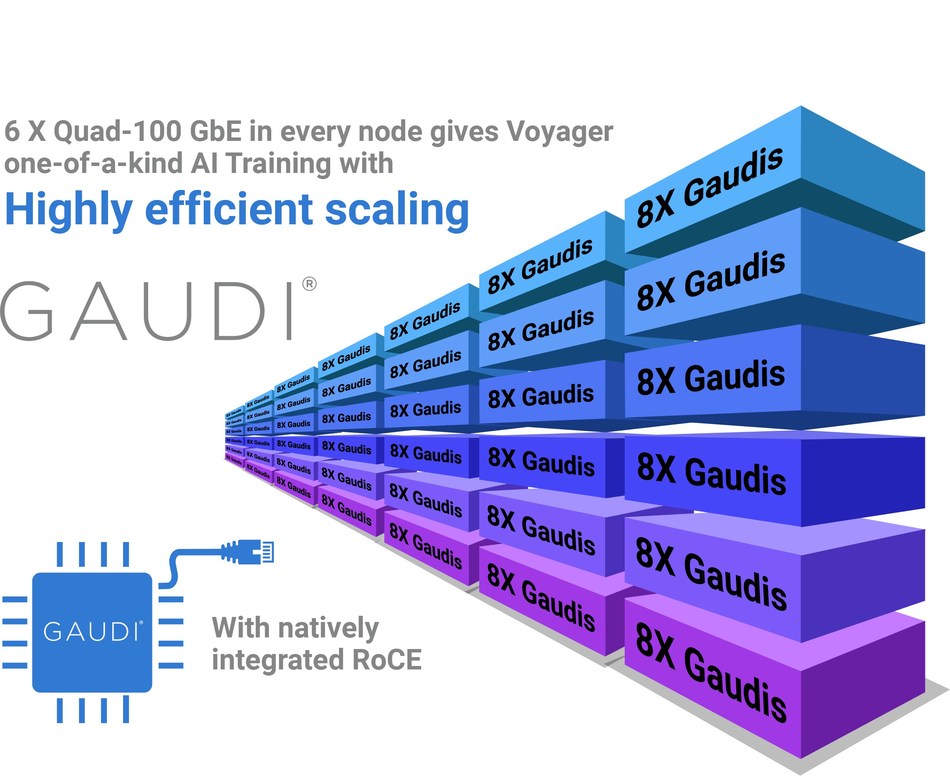Supermicro to Provide Systems Featuring Habana Gaudi AI Training and Goya AI Inference Accelerators for High-Performance Compute
Habana Labs, a leading developer of purpose-built deep learning accelerators for a wide range of data centers, announced that its artificial intelligence (AI) training and inference accelerators have been selected by the San Diego Supercomputer Center (SDSC) at UC San Diego to provide high-performance, high-efficiency AI compute in its Voyager supercomputer. Scheduled to be in service in the fall of 2021, Voyager will be dedicated to advancing AI research across a range of science and engineering domains. The system build-out, as well as ongoing community support and operations, are funded by a grant from the National Science Foundation.
Recommended ITech News: AWS Cloud Networking Expert Brad Hedlund Joins Aviatrix

The Voyager supercomputer will employ Habana’s unique interconnect technology to efficiently scale AI training capacity with 336 Gaudi processors, which are well-architected for scaling large supercomputer training applications. Gaudi is the industry’s only AI processor to natively integrate ten 100-Gigabit Ethernet ports of RoCE v2 (RDMA over Converged Ethernet) on-chip, enabling flexibility of scaling and avoidance of throughput bottlenecks that can limit scaling capacity. The Voyager system also features 16 Habana Goya processors to power AI inference models.
“With innovative solutions optimized for deep learning operations and AI workloads, Habana accelerators are ideal choices to power Voyager’s forthcoming AI research,” said Amitava Majumdar, head of SDSC’s Data Enabled Scientific Computing division and principal investigator for the Voyager project. “We look forward to partnering with Habana, Intel and Supermicro to bring this uniquely efficient class of compute capabilities to the Voyager program, giving academic researchers access to one of the most capable AI-focused systems available today.”
Recommended ITech News: SMART Modular Announces New Memory Solutions for Data Center Networking Applications
Habana Gaudi AI training and Goya inference processors are architected to drive performance and efficiency in AI operations. They will provide data scientists and researchers having access to Voyager with flexibility to customize models with programmable Tensor Processor Cores and kernel libraries, and ease implementation with Habana’s SynapseAI software platform, which supports popular machine learning frameworks and AI models for applications such as vision, natural language processing and recommendation systems.
Supermicro, a Voyager technology partner and global leader in enterprise computing, storage, networking solutions and green computing technology, will provide Habana-based AI systems to SDSC for Voyager:
- Supermicro X12 Gaudi AI Training System (SYS-420GH-TNGR) featuring eight Gaudi HL-205 cards paired with dual-socket 3rd Gen Intel® Xeon® Scalable processors, the newest high-performance processors from Intel, introduced this week
- Supermicro SuperServer 4029GP-T featuring eight Goya HL-100 PCIe cards for AI inference, paired with dual-socket 2nd Gen Intel® Xeon® scalable processors
“Combining Supermicro’s advanced application-optimized server and storage hardware with Habana’s AI training and inference products is the best solution for SDSC’s multi-year Voyager AI project,” said Ray Pang, vice president technology and business enablement, Supermicro. “We continue to work closely with leading innovators to deliver solutions for computationally intensive projects worldwide at leading research and HPC environments for science and medical discovery, compute, and leading-edge AI solutions.”
Recommended ITech News: WNS Denali Recognized as a ‘Leader’ in Procurement BPO and Digital Transformation Services by ISG
“We are honored that Habana’s AI processors have been selected to power the AI workloads that will run on San Diego Supercomputer Center’s Voyager supercomputer,” said Eitan Medina, Chief Business Officer at Habana. “This implementation of our Gaudi and Goya products showcases how top academic institutions like SDSC can harness efficiency and performance to effectively address the growing demands of AI research workloads.”
The first three years of Voyager’s operation will be the Testbed Phase, during which SDSC will work with select research teams from astronomy, climate sciences, chemistry, particle physics and other fields to gain AI experience and insights leveraging Voyager’s unique features. Throughout the Testbed Phase, SDSC will share experiences with the AI research community and develop documentation that will serve as a resource for an expanded user base in years four and five.
“The level of performance and efficiency that Voyager will require is precisely what Intel architectures are designed for,” said Trish Damkroger, vice president and general manager of Intel’s High Performance Computing group. “Our Xeon Scalable processors coupled with Habana AI accelerators will ensure Voyager’s users have the HPC and AI capabilities they need to power their game-changing research.”
Recommended ITech News: DataStax Unveils Zero-Downtime Cloud Migration Tool to Move Workloads from Apache Cassandra to DataStax Astra


